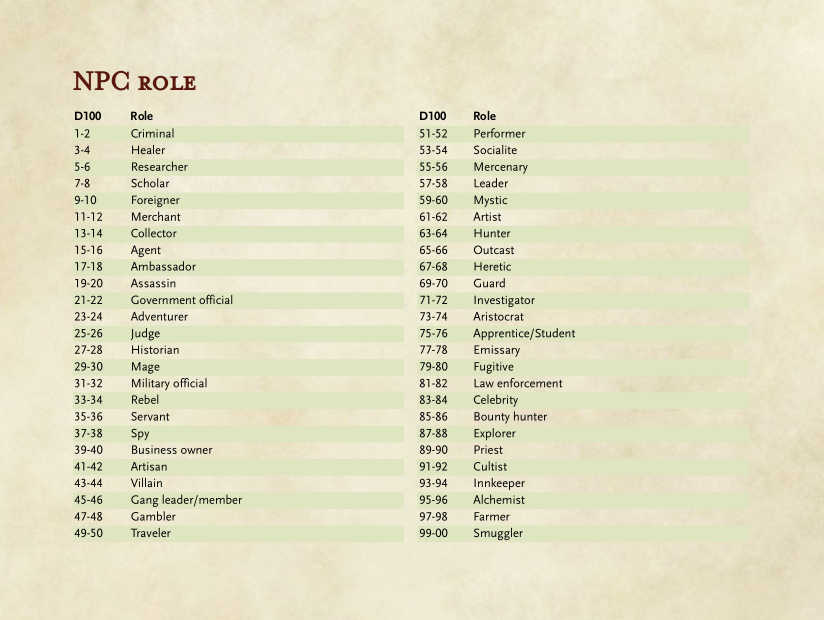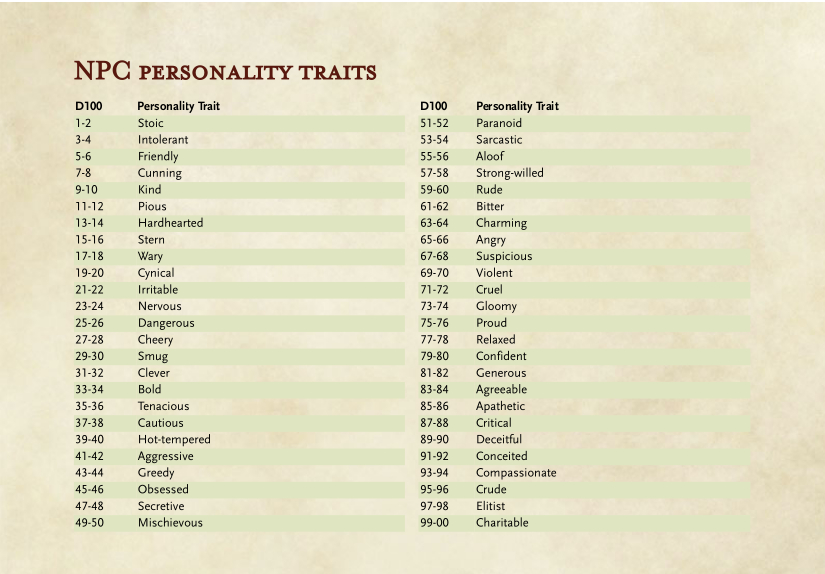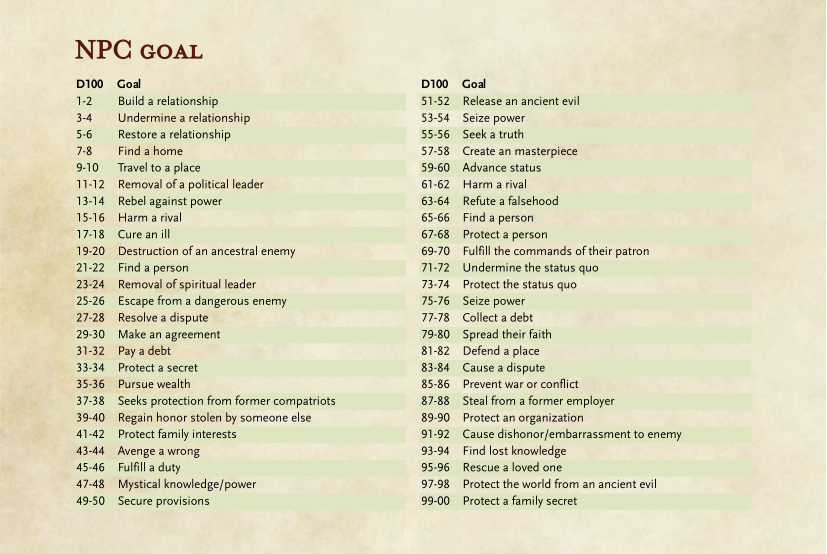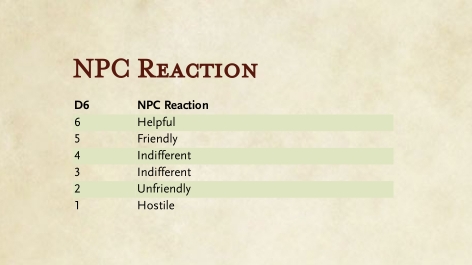The NPC Generator
Our NPC generator can create non-player characters on the fly for your solo and co-op games. The oracles in this guide can quickly generate a basic character outline for any NPC you encounter. To use it, all you need are percentile dice (D100) and the tables included below. All the oracles in this guide are available for free in the Solo Gaming Tool.
How to Use the NPC Generator
To use the NPC generator take a D100 and roll three times when you encounter an NPC. The tables will show the following things about a new NPC.
- The first table is the NPC’s role and what they do in the story. They could be a criminal, healer, or any other character. If you already know the role an NPC plays in your story, skip this card and go to the second playing card.
- The second table is the NPC’s most dominant personality trait; are they stern, aggressive, or gloomy? This card will give you a basic idea of how the NPC comes across to others. If you want a more complex character you can draw more cards.
- The third table is the NPC’s goal or motivation. It describes what they want to do in the game world. They might want to harm a rival or rebel against the authorities in your story.
The Character Role Oracle
Oracle 4: Character Role describes what the NPC does in your game world. This table contains a list of the possible types of NPCs you can encounter randomly. You don’t have to use this table if you already know what an NPC does in your world.

NPC Personality Trait Oracle
This oracle in the NPC Generator contains a collection of dominant personality traits for NPC in your game world. Use this oracle as you deem necessary. If you encounter a random stranger then, a single personality trait is all you need. However, if you need more complex personalities for more important characters, you can roll more personality traits.

The Character Goal Oracle
To give an NPC a motivation in your story, use this table in the NPC Generator. These character goals can be worked into the story as you see fit. If you already know what an NPC wants to accomplish in your story, then you can ignore this table.

Stat blocks and NPC proxies
A stat block is the list of NPC attributes that come into play during roleplaying and combat situations. Stat blocks tell you what an NPC can do in a confrontation or how your abilities can affect them. D&D’s Monster Manual contains stat blocks you can use for NPCs in Appendix B. To use these stat blocks for NPCs choose a stat block that you think matches your NPC the most.
If you want to create an exotic NPC, feel free to use monster stat blocks. These stat blocks can function as proxies for NPCs. Want to create a bandit leader who is feared across the continent and has the strength of 10 men? Use the stats of a giant instead of a default bandit. When you use monster stat blocks as proxies for NPCs you can create some very memorable characters.
Bringing NPCs into your game
You can bring an NPC into your game either deliberately or randomly. An NPC that’s deliberately created already has a predefined character role. You might need a captain of the guard for your game or the villain of your story might be a vampire. In these cases, you decide to bring the character into your game based on the needs of your adventure.
Alternatively, a random NPC is brought into the game by the Fortune Oracle. Whenever you draw a Jack, Queen, or King when using this oracle, an NPC has entered the scene. Whether this NPC is important or not depends on the plot of your story. When an NPC enters your adventure link it with a face card and write down on the Adventure Worksheet.
If you run out of a specific face card, use another one instead. The face cards can be any gender you like, the ones in the guide are only a suggestion.
When an NPC dies, simply remove them from the list. After every game review your list and decide which NPCs should stay in your adventure.
Whenever you draw face card that’s been linked to an NPC, it means that the linked NPC has entered the scene. The scene might refer to them or they might make an actual appearance, depending on the logic of your story.
Example NPC list:
You entered a town where a cult of Pazuzu has taken root. As you progressed through the story you encountered the following NPCs and linked them to face cards:
King of Spades: Harald Proudfoot (the mayor).
Jack of Spades: Alex Proudfoot (the mayor’s son and a Harper agent).
Queen of Diamonds: Rebecca Whitemane (a sorceress and ally to Harald Proudfoot).
Jack of Hearts: The cult of Pazuzu (a devil-worshipping cult).
Jack of Clubs: Dirzzt (an imp and emissary to Pazuzu).
Example of play:
To investigate the cult of Pazuzu, you managed to track down their location to a remote estate. When you arrive at the estate, you ask the Fortune oracle “What do I see outside the entrance?” You draw a King of Spades. On your Adventure Worksheet, you see that the King of Spades is linked to Harald Proudfoot, the mayor. Outside the remote estate, you see Harald Proudfoot about to enter it.
Roleplaying NPC interactions
The oracles and tools included in this tutorial are versatile enough to allow for conversations with NPCs. However, you will need to know the NPC’s basic personality and how they initially react to you.
When you want to talk to an NPC, roll for the NPC’s personality traits. To find out how an NPC reacts to you roll a 1d6 and consult the following table:

The NPC Personality Trait and NPC Reaction oracles will give an idea of how the conversation might go. You can roleplay the interaction by asking questions. To answer simple questions use the Fate Oracle. To flesh out the conversation or to engage in small-talk, use the Fortune oracle.
The various themes and keywords of the Fortune oracle cover many possible conversation topics and themes. Together with Fate rolls and a little improvisation, you can have full conversations.
The key to interacting with NPCs without a DM is to improvise a conversation. This improvised conversation is based on the questions you ask and the oracles you use to answer them. The better you become at asking good questions and using the right oracles, the more natural your social interactions will be.
Example:
You decide to confront Harald Proudfoot about his presence at the cult estate. What is he doing here? You decide to consult the Fortune oracle to tell you what he says. You draw:
2 of Diamonds
Keywords: Change, adaptation, alteration
Interpretation: He has changed his mind about the cult. One of their representatives met with him and convinced him that they don’t mean any harm. He is there to improve relations between the cult and the town.
Story events
As you play through your campaign, previous events have an impact on your adventure. Whenever a significant story event takes place, write it down on the Adventure Sheet and link it to a face card.
Example:
Harald Proudfoot befriending the cult of Pazuzu is a significant event in your adventure. You decide to record it on your Adventure Worksheet and link it to the Jack of Hearts.
Whenever you draw a Jack of Hearts, Harald Proudfoot’s friendship with the cult becomes an important factor in your scene.


